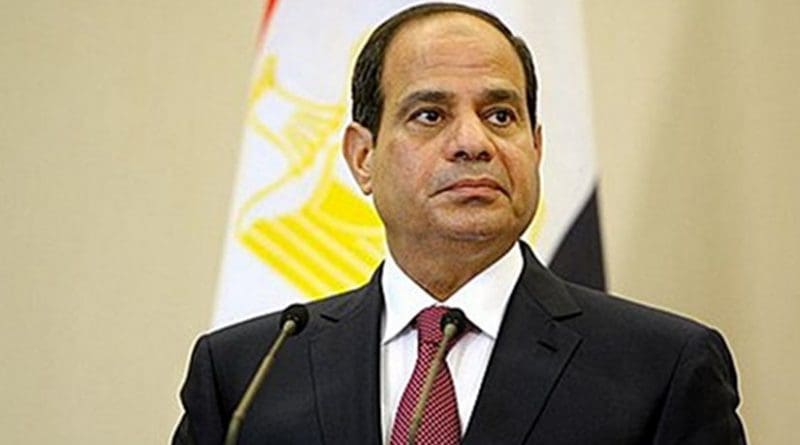El-Sisi Needs To Unite Egyptians Against Terrorism – OpEd
By Arab News
By Mohammed Nosseir*
Learning that military personnel or innocent civilians were killed in a terrorist attack ought to be utterly devastating to any citizen. The intensive and ongoing terrorist attacks in Egypt should prompt us to think about this challenge differently.
The outcome of terrorism is disastrous for society; it will never empower a political force over another, but will drag the entire nation to the edge of a slippery slope, where we could be trapped for decades. Unfortunately, not all Egyptians are aware of this, nor is the state addressing the issue properly.
The state faces several intense, nationwide and recurrent battles. We are in a clear conflict with two regional countries, we are negatively affected by the wars in Iraq, Syria and Libya, and Daesh has managed to carry out several terrorist attacks on Egyptian soil.
Additionally, the government is engaged in an open struggle with both the Muslim Brotherhood and reformists, and we are undergoing an economic crisis that entails inflation, stagnation, and a drop in foreign investments and the number of tourists. These challenges, and many others, are enough to exhaust any stable nation.
Accountability is about doing our utmost after considering all scientifically validated options. This is probably what is missing in Egypt; we are focusing on solving our problems via the single option of eliminating our enemies. We are using a methodology that has so far proven unsuccessful, continuing to rely on the same thinking that has led to the multiplication of our economic and political burdens, and the misuse of our nation’s resources.
Yet we insist that we are on the right path. We must stop tackling our challenges from a narrow perspective, and make better use of our energy and resources to address them and combat terrorism intelligently. Imprisoning youngsters endlessly, based on the claim of preventing a new uprising, is distancing millions of Egyptian youths from any kind of unifying mission.
By concentrating on accusing a country in the region of supporting terrorism in Egypt, we are shifting the state’s focus away from overcoming an internal challenge to inciting citizens against a country that presumably will not alter its policy soon. Effective enforcement of the rule of law for ordinary crimes will help the security apparatus and society to tackle terrorism more successfully.
Polarizing our society into citizens who support the government and those who oppose it will cause those identified as “evil” to value the nation less. We cannot expect a citizen who believes he has been treated unjustly for years to support the state’s mission.
Properly applying justice will unite Egyptians against terrorism. Putting the energy and resources of the security apparatus to better use while uniting society against a single enemy — terrorism — will decrease terrorist activity considerably. “We are in a state of war against terrorism,” President Abdel Fattah El-Sisi has declared repeatedly. This statement has probably not been persuasive enough to obtain the international support desired by Egypt.
The reluctance of other nations to support it should prompt us to revisit our policy on terrorism and other politically related issues. El-Sisi has taken many measures to avoid another uprising, which in my opinion constitutes a less dangerous challenge to Egypt than the gradually impending prospect of turning into a failed state.
It is now obvious that terrorism has penetrated Egypt mentally and physically. This is a clear and present danger, and we must spare no efforts, resources or ideas to combat it. Many Egyptians, myself included, believe that in any given matter, there is always room for improvement. Sadly, this window is unnoticed by the government.
We need to chuck out the thinking underlying our current ruling mechanism. Seniority and hierarchy are not always the best methods for tackling challenges; sometimes an executive recruited from outside the system can add value. The Egyptian state is undoubtedly in desperate need of reformulating its policies and tactics.
• Mohammed Nosseir, a liberal politician from Egypt, is a strong advocate of political participation and economic freedom. He can be reached on Twitter @MohammedNosseir.

